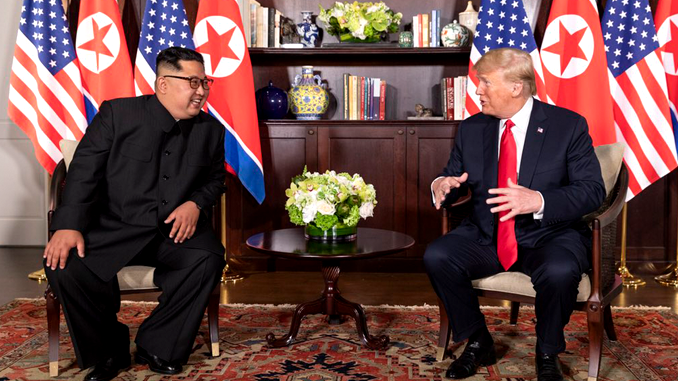
Kim Jong Un, amidst a four-day policy meeting in North Korea, presented a shift in the official position on nuclear weapons.
The Korea Herald, a daily paper from South Korea, quoted Kim:
“Under such conditions, there is no reason for us to be unilaterally bound to the commitment any longer,” Kim was quoted as saying. “If the US continues to pursue a hostile policy against the North, there will never be denuclearization on the peninsula.”
The “conditions” to which Kim is referring are the continued joint military operations between South Korea and the United States, military exercises which have been repeatedly scaled back or abandoned while President Trump has pursued a policy of mutual adoration with the familicidal dictator.
North Korea’s demands are simple: an end to all remaining economic sanctions and and end to all joint military operations between the United States and South Korea.
The Korean term for Kim’s policy is “byungjin”, which means that North Korea will simultaneously seek to develop both militarily and economically, returning to an overt development of nuclear weaponry. This was the official policy until Trump began making concessions.
President Trump, by repeatedly meeting with Kim Jong Un, has normalized the country, dramatically raising its status from a rogue nation to one of many which simply has U.S. sanctions against it. Kim’s prominence on the world stage has risen such that he no longer seeks to have direct association with Trump. While Trump’s appearance at a summit was a great prize for Kim in 2007, Kim now views his own summit attendance as a bargaining chip against President Trump.
As part of its efforts to maintain good relations, the United States reportedly has paid an exorbitant bill for medical costs attributed to an abused American hostage seized and effectively murdered by the North Korean regime. Sanctions have not been fully lifted, but the U.S. has encouraged South Korea to pursue talks with North Korea about potential reunification and the U.S. has repeatedly moved to pressure both of its key regional allies, South Korea and Japan, on various military and economic topics.
The shift in policy is not surprising. There have been repeated indications that North Korea has not been keeping up to its side of the verbal agreement – an agreement which was criticized at the time for being nonspecific and unsigned. Indeed, a key argument was that Trump was being foolish in his elevation of North Korea, granting them nearly everything they’d demanded for decades. Concerns among critics of the President’s North Korea policy is that he was paving the way for rapid development of weaponry which could threaten America as well as her allies.
While Trump has been attempting to reconcile with Kim in pursuit of another summit, Kim has been covertly building missile bases, pressing ahead on weaponry advances in formats other than intercontinental missiles, and pursuing fuel configurations which would enable the flight of intercontinental weaponry.
The result, a scant two years from a position where North Korea was isolated on the world stage and only slowly developing their weapons systems, is exactly what those critics feared: a North Korea which is, for the first time, a direct threat to the United States mainland.
